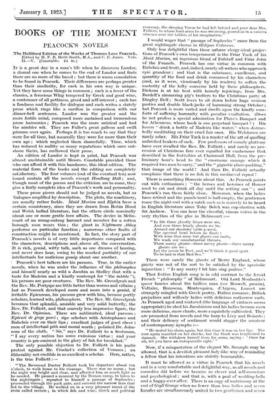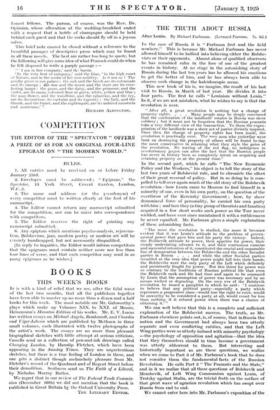BOOKS OF THE MOMENT
PEACOCK'S NOVELS
IT is a great day in a man's life when he discovers Landor,
a dismal one when he comes to the end of Landor and finds there are no more of the breed ; but there is warm consolation to be found in Peacock. Their differences are perhaps greater than their similarity, for each in his own way is unique. :Yet they have some things in common ; each is a lover of the classics, a ferocious Whig tempered by Greek and good wine, a contemner of all pettiness, greed and self-interest ; each has a fondness and facility for dialogue and each writes a stately prose which rings like a carillon in comparison with our
,dinner-bell sentences. Landor was the greater and the more fertile mind, composed more sustained and tremendous prose harmonies ; Peacock was the more satirical and had the nimbler wit. They are Fuller's great galleon and swift pinnace over again. Perhaps it is too much to say that they 'were for all time, but assuredly they were for more than their own age ; which neglected them shamefully. Time, which has reduced to nullity so many reputations which once out- shone theirs, has mellowed their prose.
An edition of Landor is kept in print, but Peacock was almost unobtainable until Messrs. Constable provided those -who can afford it with this handsome, this ideal edition. The material form of the books and the editing are completely
,satisfactory. The four volumes (out of the eventual ten) now issued contain all the novels except Headlong Hall ; and, though most of the poems and the criticism are to come, they give a fairly complete idea of Peacock's work and personality. These prose pieces should not be judged as novels, but as lialogues amplified by description. The plots, the machinery, are usually rather feeble. Maid Marian and Elphin have a
certain consistency, since they are drawn from Robin Hood and Welsh ballad literature, but the others circle nominally
about one or more gentle love affairs. The device in Melin- court of an orang-outang baronet and member for a rotten borough soon wears thin ; the ghost in Nightmare Abbey performs no particular function ; numerous other faults of construction might be mentioned. In fact, the story part of p'eacock's novels is of very little importance compared with the characters, descriptions and, above all, the conversation. lIt is rich, genial, witty talk, such as one dreams of hearing, and never does hear, owing to the marked partiality of our intellectuals for malicious gossip about one another.
Peacock's best talkers are his parsons. True, in the earlier novels, when he was under the influence of the philosopher
and himself nearly as wild a Jacobin as Shelley (but with a taste for Madeira and a kindly contempt for " the rabble "),
his parsons are poor creatures. The Rev. Mr. Grovelgrub and the Rev. Mr. Portpipe are little better than worms and villains ; but as Peacock developed more and more into a genial, if irritable Epicurean, his parsons grew with him, became portly scholars, learned wits, philosophers. The Rev. Mr. Grovelgrub becomes that splendid, amiable and very solid butterfly, the Rev. Dr. Folliott, and that scarcely less impressive figure, the Rev. Dr. Opimian. These are sublimated, ideal parsons ; Epicuri do grege porci ; ripe scholars with Aristophanes and ,Rabelais ever on their lips ; excellent judges of good cheer ; men of intellectual pith and moral worth ; polished Dr. John- sons of the cloth. " Sir," says Dr. Folliott to a Scotsman, say every nation has some eximious virtue ; and your
country is pre-eminent in the glory of fish for breakfast." I The only possible objection to Dr. Folliott is his pudic protest against Mr. Crochet's collection of Venuses ; an illiberality not credible in so excellent a scholar. Here, rather, is the true Folliott
" The Reverend Doctor Folliott took his departure about ten o'clock, to walk home to his vicarage. There was no moon ; but the night was bright and clear, and afforded him as much light as he needed. He paused a moment by the Roman camp, to listen to the nightingale ; repeated to himself a passage of Sophoeles ; proceeded through the park gate, and entered the narrow lane that 'led to the village. He walked on in a very pleasant mood of the state called reverie ; in which fish and wine, Greek and political
economy, the sleeping Venus he had left behind and poor dear Mrs. Folliott, to whose fond arms he was returning, passed as in a camera obscure over the tablets of his imagination."
I would wager that " passage of Sophocles " came from the great nightingale chorus in CEdipus Coloneus.
Only less delightful than these urbane clergy-ideal projec- tions of Peacock's own temperament is the Friar Tuck of his Maid Marian, ad ingenious blend of Falstaff and Friar John of the Funnels. Peacock has one virtue in common with Rabelais and Scott, and, indeed, nearly all writers who approach epic grandeur ; and that is the substance, excellence, and quantity of the food and drink consumed by his characters (and, as it were, vicariously by his readers) to soften the austerity of the lofty converse held by these philosophers. Dickens is at his best with homely rejoicings, from Mrs. Bardell's simmering pig's trotters to the Christmas party at Dingley Dell ; Scott loves to sit down before huge venison pasties and double black-jacks of humming strong October ; but Peacock is more varied and dwells upon the kindly com- • forts of suffering humanity with peculiar exultation. (Does he not profess a special admiration for Plato's Banquet and for Athenaeus, whose book is one perpetual banquet ? ) His lovers " drink a bottle of Madeira like water," when distrac- tedly meditating on their cruel fair ones. His Welshmen are rarely sober. His Friar Tuck is a master of the art of quaffing unlimited beakers of sack. Few professors of comely gluttony have ever rivalled the Rev. Dr. Folliott ; and surely no pro- cession of Christmas fare ever equalled for exuberance that described in the festivities at Chainmail Hall, from the pre- liminary boar's head to the " enormous sausage which it required two men to carry," and the " gigantic plum-pudding," that image of the world ! And then Dr. Folliott actually complains that there is no fish in this mediaeval repast !
There is something Homeric about this. As Peacock points out with enthusiasm : " the heroes and heroines of Homer used to eat and drink all day until the setting sun " ; and Peacock's run them fairly close. Moreover, when the ladies have retired and the punch-bowl is half-empty, the gentlemen rouse the night-owl with a catch such as is scarcely to be heard in English literature since Toby Belch was cup-shotten with Sir Andrew. You can hear the cheerful, vinous voices in the very rhythm of the glee in Melincourt :—
" In life three ghostly friars were we,
And now three friarly ghosts we be.
Around our shadowy table paced, The spectral bowl before us floats : With wine that none but ghosts can taste, We wash our unsubstantial throats.
Three merry ghosts—three merry ghosts—three merry ghosts are we : Let the ocean be Port, and we'll think it good sport To be laid in that Red Sea."
These were surely the ghosts of Merry England, whose gaiety was not of the sort to be satisfied by the apostolic injunction : " Is any merry ? let him sing psalms."
That festive English song is in odd contrast to the fervid French " philosophy " of Melincourt. Old Lord Monboddo's queer fancies about the tailless man (see Boswell, passim), Voltaire, Rousseau, Montesquieu, d'Argens, Louvet arc strangely mingled with Greek poetry, Italian romance, British prejudices and willowly ladies with delicious corkscrew curls. As Peacock aged and matured (the language of vintners seems appropriate) he shed his Jacobinism and his ladies became even more delicious, more chaste, more exquisitely cultivated. They are promoted from novels and the harp to Livy and Boiardo ; and their delicacy of sentiment would stagger the amateur of contemporary nymphs " He sealed his claim again, but this time it was on her lips. The rose again mantled on her cheeks, but the blush was heightened to damask. She withdrew herself from his arms, saying : ' Once for all, till you have an indisputable right.' " Now, if a misquotation of the elegant Mr. Smangle may be allowed, that is a devilish pleasant lady-like way of reminding a fellow that his intentions are strictly honourable.
It must be allowed as a virtue in Peacock that his novels end in a very comfortable and delightful way, as all novels and comedies did before we became so clever and self-conscious and psychological ; and that is, with a peal of wedding-bells and a happy-ever-after. There is an orgy of matrimony at the end of Gryll Grange when no fewer than two ladies and seven females arc simultaneously united to two gentlemen and seven
honest fellows. The parson, of course, was the Rev. Dr. Opirnian, whose allocution at the wedding-breakfast ended with a request that a bottle of champagne should be held behind each guest and that the corks should fly off in a joyous salvo.
This brief note cannot be closed without a reference to the beautiful passages of descriptive prose which may be found in all these novels. The best are rather too long to quote, but the following will give some idea of what Peacock could do when he felt disposed to write a purple passage :-
" I am in fine company,' said th3 baron.
' In the very best of company,' said the friar, in the high court of Nature, and in the midst of her own nobility. Is it not so ? The goodly grove is our palaco : the oak and the beech are its colonnade and its canopy : the sun and the moon and the stars are its ever- lasting lamps : the grass, and the daisy, and the primrose, and the are its many-coloured floor of green, white, yellow and blue ; the may-flower, and the woodbine, and the eglantine, and the ivy, are its decorations, its curtains and its tapestry : tho lark, and the thrush, and the linnet, and the nightingale, are its unhired minstrels and musicians."!
RICHARD ALDINCTON.











































 Previous page
Previous page